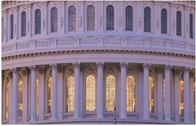Advertisement
Industry Panel to Congress: Housing Reform Must Provide Reliable Credit to Homebuyers

The National Association of Home Builders (NAHB) has told Congress that proposed mortgage lending reforms under the Dodd-Frank Act must be imposed in a manner that causes minimum disruption to the mortgage markets while ensuring consumer protections. Testifying before the House Financial Services Subcommittee on Financial Institutions and Consumer Credit, NAHB First Vice Chairman Rick Judson, a home builder from Charlotte, N.C., said that, "NAHB believes a housing finance system that provides adequate and reliable credit to homebuyers at reasonable interest rates through all business conditions is critical to our nation's economic health."
In addition to Judson, also participating at the hearing, “The Impact of Dodd-Frank’s Home Mortgage Reforms: Consumer and Market Perspectives” were:
►The Honorable Kenneth E. Bentsen Jr., Executive Vice President of Public Policy and Advocacy, Securities Industry and Financial Markets Association
►Alys Cohen, Staff Attorney, National Consumer Law Center
►Tom Hodges, General Council, Clayton Homes, on behalf of the Manufactured Housing Institute
►John Hudson, Manager, Premier Nationwide Lending, on behalf of National Association of Mortgage Brokers
►Rick Judson, First Vice Chairman of the Board, National Association of Home Builders
►Scott Louser, 2012 Vice President and Liaison, Government Affairs, National Association of Realtors
►Eric Stein, Senior Vice President, Self-Help
►Debra W. Still, CMB, Chairman-Elect, Mortgage Bankers Association
At the heart of this issue is the definition of a new "qualified mortgage (QM)" as required under the Dodd-Frank Act passed in 2010 that could have a profound effect on mortgage originations. The legislation includes an "ability-to-repay" provision that requires lenders to establish that homebuyers have a reasonable chance of paying back the loan at the time the mortgage is written. This will set the foundation for the future of mortgage financing, as all mortgages will be subject to these requirements.
"NAHB urges the Consumer Financial Protection Bureau (CFPB) and policymakers to consider the long-term ramifications of these rules on the market, and not to place unnecessary restrictions on the housing market based solely on today's economic conditions," said Judson. "Overly restrictive rules will prevent willing, creditworthy borrowers from entering the housing market."
NAHB has joined with 32 other housing, banking, civil rights and consumer groups to urge the CFPB to issue broadly defined and clear QM standards that contain strong consumer protections, promote mortgage liquidity in the marketplace and provide lenders proper incentives to make home loans to creditworthy borrowers.
A narrowly defined QM would put many of today's sound loans and creditworthy borrowers into the non-QM market, which would undermine prospects for a housing recovery. Loans that fail to qualify as QMs would be less available and far costlier because lenders and investors would face a much greater risk of violating the terms of the new ability-to-repay requirement. Under a narrow QM definition, lenders would further restrict home mortgage credit in what is already a tight lending environment because they would be fearful of the severe penalties that would be imposed if they failed to satisfy the ability-to-repay requirement under the more uncertain standards that would apply in the non-QM market.
Even with a broader QM definition, the flow of credit could be restrained if lenders face a high risk of legal challenges to their loan decisions. To best ensure safer, well documented and underwritten loans without limiting the availability or increasing the costs of credit to borrowers, NAHB supports a QM safe harbor definition that would provide more assurance to lenders that they will not be subject to increased litigation if they use sound underwriting criteria. The safe harbor should incorporate specific ability-to-repay standards, said Judson.
"We recommend that the regulators work with NAHB and other industry stakeholders to develop a workable safe harbor," said Judson. "The final rule should promote liquidity by providing consumers stronger protections than those proposed by the Federal Reserve Board and giving financial institutions definitive lending criteria that reduces excessive litigation exposure."
Noting that in a period of historically low interest rates prospective home buyers are finding it more difficult to obtain mortgage credit, Judson called on policymakers to take great care to avoid further changes that could exacerbate the situation.
"Consumers must have access to a responsible and sustainable housing credit market, so as we strengthen lending regulations to avoid past excesses, we must be careful not to create an environment where mortgage loans are subject to unnecessarily heightened litigation risks," Judson said. "Excessive litigation exposure and severe penalties for violating the ability-to-repay standards would further restrict mortgage lending for all Americans and could cause low- to moderate-income and minority populations to suffer disproportionately."
About the author





